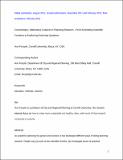| dc.contributor.author | Forsyth, Ann | |
| dc.date.accessioned | 2014-08-24T20:08:02Z | |
| dc.date.issued | 2012 | |
| dc.identifier.citation | Forsyth, Ann. 2012. Commentary: Alternative Cultures in Planning Research--From Extending Scientific Frontiers to Exploring Enduring Questions. Journal of Planning Education and Research 32, no. 2: 160–168. | en_US |
| dc.identifier.issn | 0739-456X | en_US |
| dc.identifier.issn | 1552-6577 | en_US |
| dc.identifier.uri | http://nrs.harvard.edu/urn-3:HUL.InstRepos:12748041 | |
| dc.description.abstract | As the planning academy has grown and evolved, it has developed different ways of doing planning research. People may (a) work at the scientific frontier, (b) investigate issues of practical relevance, (c) reflect on the implications of practice, or (d) try to answer the enduring questions of planning. These are important differences. Different cultures represent varying ideas about what constitutes an important or significant contribution to the field of planning. | en_US |
| dc.language.iso | en_US | en_US |
| dc.publisher | Sage Publications | en_US |
| dc.relation.isversionof | doi:10.1177/0739456x12442217 | en_US |
| dash.license | LAA | |
| dc.subject | planning education | en_US |
| dc.subject | research methods | en_US |
| dc.subject | research culture | en_US |
| dc.title | Commentary: Alternative Cultures in Planning Research--From Extending Scientific Frontiers to Exploring Enduring Questions | en_US |
| dc.type | Journal Article | en_US |
| dc.description.version | Version of Record | en_US |
| dc.relation.journal | Journal of Planning Education and Research | en_US |
| dash.depositing.author | Forsyth, Ann | |
| dc.date.available | 2014-08-24T20:08:02Z | |
| dc.identifier.doi | 10.1177/0739456x12442217 | * |
| dash.contributor.affiliated | Forsyth, Ann | |


